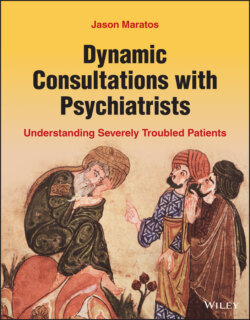Читать книгу Dynamic Consultations with Psychiatrists - Jason Maratos - Страница 57
Personal History
ОглавлениеMrs. C was born in the city and was the third of four siblings. Her eldest brother died when he was an infant after a fever and before Mrs. C was born. Her eldest sister remained in the country under the care of her maternal grandparents when her parents immigrated to the city. Mrs. C and her younger brother were born in the city. Mrs. C has a distant relationship with her eldest sister because they have lived apart all their lives.
Mrs. C reported having a good relationship with her younger brother and her parents; she claimed that her parents loved both her and her brother dearly because they did not have many children. Mrs. C felt that she had led a happy childhood despite being poor and living in a wooden hut. From a young age, she knew the importance of bringing money home. Mrs. C claimed that her mother died in her arms in her 80s and that her mother had waited for her to come to the hospital to see her final moment. Her father moved in with her, after her younger sister‐in‐law died, and stayed with her until his death. Mrs. C has no family history of mental illness.
Mrs. C studied until Form 2 at night school and then worked as a factory worker until she was about 50 years old. When her husband had a stroke, when she was around 60 years old, she attended a course to learn how to care for the debilitated and became a helper at an old age home after attending the course. She later studied at the open university (in 2009–2010) because she wanted to have a better work‐life balance. Mrs. C was keen on learning.
Mrs. C married after dating for 2 years. She had a good relationship with her husband. Mrs. C commented that her husband was outgoing and liked small gambling but was never in debt. Her husband would take her to trips or buy her good food when he won on betting. When her husband suffered the stroke in 2000, she claimed there was not much support or education given to her at the time. She was told by the doctor that her husband may have recurrent strokes and told her to be careful, but she claimed that she did not know what was meant by this. Mrs. C felt that the doctors were not helpful in advising her how to look after her husband, and as a result, Mrs. C felt helpless. He had stayed in the intensive care unit with a Ryle's (nasogastric) tube at the time, and he was bedbound. Since his discharge from hospital, she had a transient thought of pushing him out the window and jumping from the height with him, but she later changed her mind after thinking that her husband's father was still alive. She later took him to see practitioners of traditional Chinese medicine (each appointment costing the equivalent of about US$50) and hired a maid to help care for him. She claimed she had spent her life savings and sold their minibus to pay for his medical bills. Her husband used to work as a minibus driver. When he entered hospital, she was mocked by relatives for placing him there. Mrs. C claimed that her husband's father was unsupportive, and he claimed that her husband deserved the stroke because he smoked. There was no further support from family members. He eventually had some improvement and was able to walk with a stick but then suddenly developed an infection and died within 3 days. She was disappointed that after she had achieved such an improvement in him, he would die so suddenly.
Mrs. C has two daughters and one son. Her son emigrated when he was in his 20s; her eldest daughter studied in Australia and later worked in the country. Her younger daughter works on a nearby city, she visits her weekly and gives her the equivalent of about US$300 a month. She reported having a quite distant relationship with her children because they work abroad and have their own lives.
